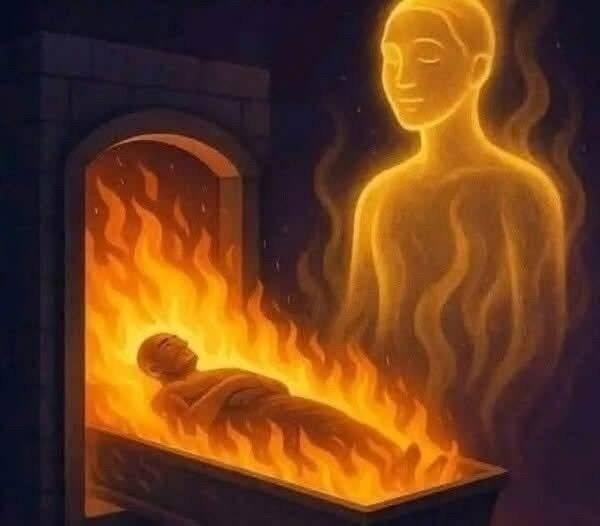In recent years, more families are choosing cremation over traditional burial — due to cost, environmental concerns, or personal preference.
For Christians, this raises an important question:
Does the Bible forbid cremation?
After all, we believe in the resurrection of the body and the sanctity of life — so how should we treat the body after death?
Let’s explore what Scripture actually says (and doesn’t say) about cremation, how early believers honored the dead, and how Christians today can make peaceful, informed decisions — without fear or judgment.
Because real faith isn’t about rules without context. It’s about love, hope, and trusting God with every season of life — including death.
🔍 What the Bible Says About the Body After Death
First, the truth: 👉 The Bible never explicitly commands burial — nor does it condemn cremation.
There is no verse that says, “Thou shalt not burn the body.”
Instead, we see that burial was the common practice in biblical times — especially among the Israelites and early Christians.
Why?
- It reflected reverence for the body as God’s creation
- It aligned with Jewish customs of honoring the dead
- It symbolized the hope of resurrection (just as Jesus was buried and rose again)
But custom ≠ command.
Just because something was typical doesn’t mean it’s required.
⚰️ Burial in the Bible: A Symbol of Hope
Many key figures were buried:
- Abraham (Genesis 25:9)
- Joseph (Hebrews 11:22)
- Jesus Christ (Matthew 27:59–60) — His burial points forward to resurrection
Burial became a powerful picture of:
- Dignity in death
- Trust in God’s power to raise the dead
- The belief that the body matters — even after life ends
Paul writes in 1 Corinthians 15:42–44:
“So will it be with the resurrection of the dead… it is sown a natural body, it is raised a spiritual body.”
This passage focuses on resurrection, not the condition of the body in the grave.
And here’s the good news: 👉 God is not limited by how a body returns to dust.
Whether through decay or fire, He who formed us from the dust can raise us again.
🔥 Is Cremation Mentioned in the Bible?
Yes — but not as a funeral practice.
In Scripture, burning is usually associated with:
- Judgment (e.g., Sodom and Gomorrah – Genesis 19)
- Punishment for sin (Leviticus 20:14; 21:9)
- Destroying pagan items (Joshua 7:25)
However, these are not examples of cremating human remains for burial — they’re acts of divine or judicial action.
There is no example of God condemning someone for being burned after death, nor a law against cremation in the New Testament.
✅ What About the Resurrection?
One of the biggest concerns Christians have is:
Will God still raise my body if I’m cremated?
The answer is a confident yes.
God created the universe from nothing — He doesn’t need an intact corpse to resurrect a person.
Consider:
- Bodies naturally decompose — turning to dust over time
- Many believers have been lost at sea, eaten by animals, or destroyed in disasters
- In war, fire, or famine, bodies are often unrecognizable
Yet Paul assures us:
“The trumpet will sound, and the dead will be raised imperishable” (1 Corinthians 15:52)
Our resurrection depends on Christ’s power, not the preservation of our physical remains.
💬 What Do Christian Denominations Say?
Different traditions hold varying views:
| Roman Catholic Church | Permitted since 1963; ashes should be kept in sacred places (not scattered or divided) |
| Eastern Orthodox | Generally discourages cremation, prefers burial |
| Southern Baptist & Evangelical Churches | Allowed, but burial is often preferred as a symbol of resurrection |
| Methodist, Lutheran, Anglican | Accept cremation as a valid choice |
✅ Most agree: Cremation is not a sin — but how we honor the body matters.
🤲 Making a Peaceful Decision
If you’re considering cremation — for yourself or a loved one — here are some biblical principles to guide you:
| Honor the body | Treat remains with dignity — whether buried or cremated |
| Trust God’s power | He will raise the dead, no matter the condition of the body |
| Respect family and conscience | Some feel strongly about burial — others find peace in cremation |
| Follow legal and church guidelines | If part of a denomination, check their teachings on handling ashes |
📌 Tip: Many churches now allow urns to be present during memorial services — just like caskets.
❌ Debunking Common Myths
| ❌ “Cremation prevents resurrection” | False — God is not limited by how the body returns to dust |
| ❌ “Only burial shows faith in the resurrection” | No — cremation doesn’t deny resurrection; many cremated believers trust in it deeply |
| ❌ “Cremation is pagan” | While used in some ancient pagan rituals, it’s also practiced in cultures worldwide — including modern, faithful Christians |
| ❌ “The Bible forbids it” | There isno direct prohibitionin Scripture |
Final Thoughts
You don’t have to choose between faith and practicality.
Whether you bury or cremate, what matters most is your trust in Christ — the One who conquered death and promises new life.
So if you’re grieving, planning ahead, or simply wondering… take heart.
Your body — whether laid in the earth or returned to dust by fire — is still held in the hands of the Creator.
And on the day of resurrection? He will call your name.
Not because of how you were buried. But because of who you belong to.
And that kind of hope? It outlasts every grave — and every flame.









